Chris Bishop’s PRML
Ch. 3: Linear Models of Regression
Mathieu Guillaumin & Radu Horaud
October 25, 2007
Mathieu Guillaumin & Radu Horaud
Chris Bishop’s PRML Ch. 3: Linear Models of Regression
�
Chapter content
I An example – polynomial curve fitting – was considered in
Ch. 1
I A linear combination – regression – of a fixed set of nonlinear
functions – basis functions
I Supervised learning: N observations {xn} with corresponding
target values {tn} are provided. The goal is to predict t of
a new value x.
I Construct a function such that y(x) is a prediction of t.
I Probabilistic perspective: model the predictive distribution
p(t|x).
Mathieu Guillaumin & Radu Horaud
Chris Bishop’s PRML Ch. 3: Linear Models of Regression
�
Figure 1.16, page 29
Mathieu Guillaumin & Radu Horaud
Chris Bishop’s PRML Ch. 3: Linear Models of Regression
txx02σy(x0,w)y(x,w)p(t|x0,w,β)�
The chapter section by section
3.1 Linear basis function models
I Maximum likelihood and least squares
I Geometry of least squares
I Sequential learning
I Regularized least squares
3.2 The bias-variance decomposition
3.3 Bayesian linear regression
I Parameter distribution
I Predictive distribution
I Equivalent kernel
3.4 Bayesian model comparison
3.5 The evidence approximation
3.6 Limitations of fixed basis functions
Mathieu Guillaumin & Radu Horaud
Chris Bishop’s PRML Ch. 3: Linear Models of Regression
�
Linear Basis Function Models
M−1X
j=0
y(x, w) =
wjφj(x) = w>φ(x)
where:
I w = (w0, . . . , wM−1)> and φ = (φ0, . . . , φM−1)> with
φ0(x) = 1 and w0 = bias parameter.
I In general x ∈ RD but it will be convenient to treat the case
x ∈ R
I We observe the set X = {x1, . . . , xn, . . . , xN} with
corresponding target variables t = {tn}.
Mathieu Guillaumin & Radu Horaud
Chris Bishop’s PRML Ch. 3: Linear Models of Regression
�
Basis function choices
I Polynomial
I Gaussian
I Sigmoidal
φj(x) = exp
x − µj
s
φj(x) = σ
φj(x) = xj
− (x − µj)2
2s2
with σ(a) =
1
1 + e−a
I splines, Fourier, wavelets, etc.
Mathieu Guillaumin & Radu Horaud
Chris Bishop’s PRML Ch. 3: Linear Models of Regression
�
Examples of basis functions
Mathieu Guillaumin & Radu Horaud
Chris Bishop’s PRML Ch. 3: Linear Models of Regression
−101−1−0.500.51−1010 0.250.5 0.751 −10100.250.50.751�
Maximum likelihood and least squares
t = y(x, w)
+
deterministic
Gaussian noise
�|{z}
| {z }
NY
n=1
For a i.i.d. data set we have the likelihood function:
p(t|X, w, β) =
N (tn| w>φ(xn)
|
{z
mean
}
, β−1|{z}
var
)
We can use the machinery of MLE to estimate the parameters w
and the precision β:
wM L = (Φ>Φ)−1Φ>t with ΦM×N = [φmn(xn)]
and:
tn − w>
M Lφ(xn)2
NX
n=1
β−1
M L =
1
N
Mathieu Guillaumin & Radu Horaud
Chris Bishop’s PRML Ch. 3: Linear Models of Regression
�
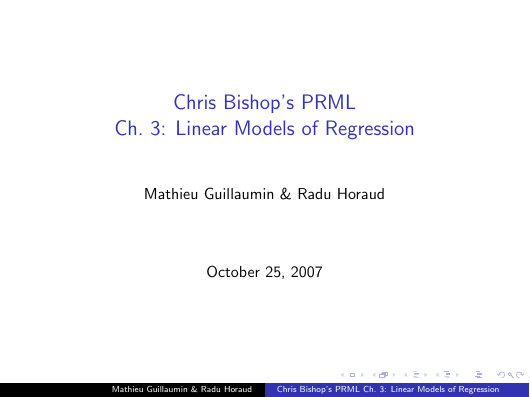
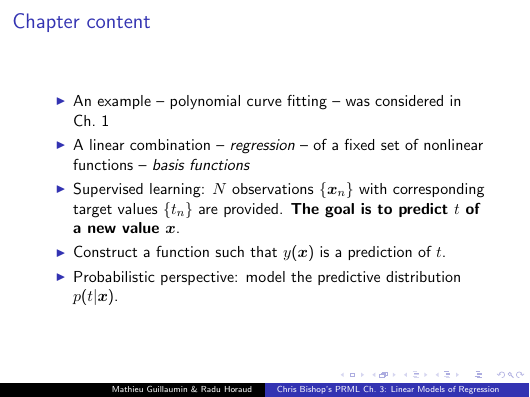
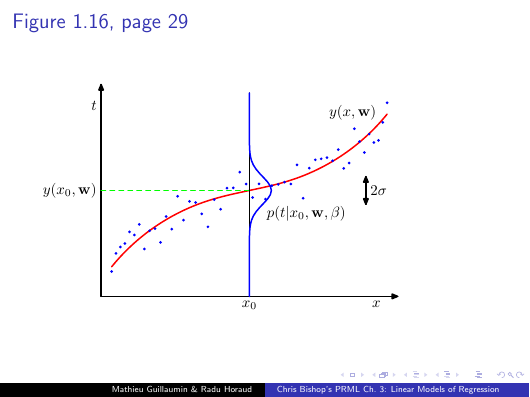
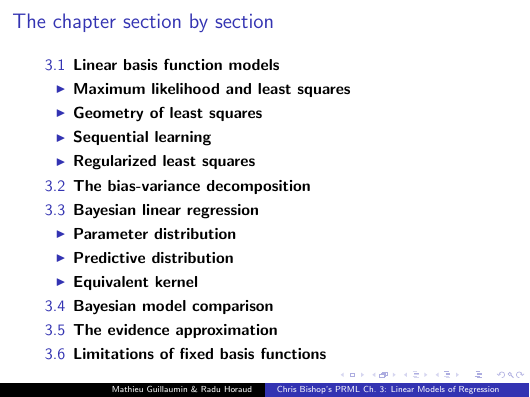
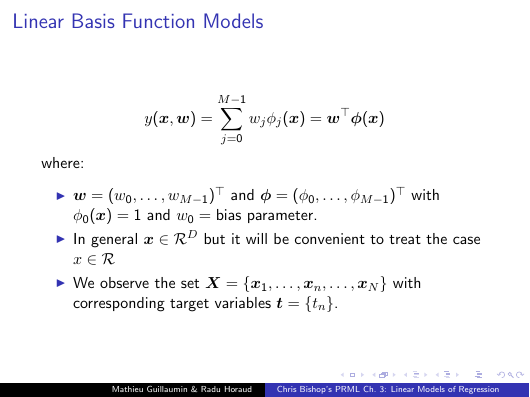
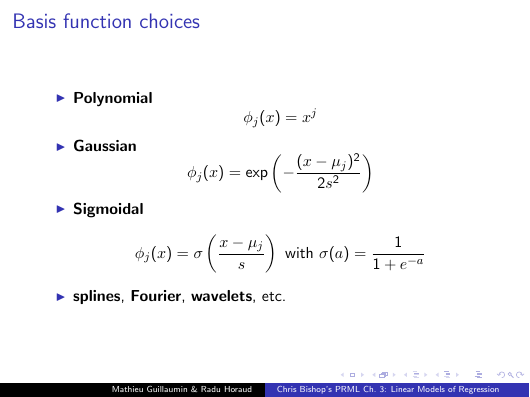

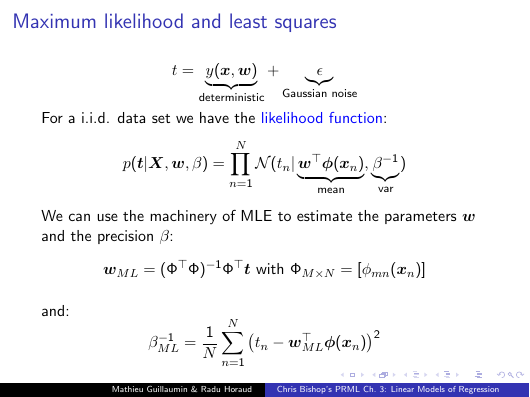








 2023年江西萍乡中考道德与法治真题及答案.doc
2023年江西萍乡中考道德与法治真题及答案.doc 2012年重庆南川中考生物真题及答案.doc
2012年重庆南川中考生物真题及答案.doc 2013年江西师范大学地理学综合及文艺理论基础考研真题.doc
2013年江西师范大学地理学综合及文艺理论基础考研真题.doc 2020年四川甘孜小升初语文真题及答案I卷.doc
2020年四川甘孜小升初语文真题及答案I卷.doc 2020年注册岩土工程师专业基础考试真题及答案.doc
2020年注册岩土工程师专业基础考试真题及答案.doc 2023-2024学年福建省厦门市九年级上学期数学月考试题及答案.doc
2023-2024学年福建省厦门市九年级上学期数学月考试题及答案.doc 2021-2022学年辽宁省沈阳市大东区九年级上学期语文期末试题及答案.doc
2021-2022学年辽宁省沈阳市大东区九年级上学期语文期末试题及答案.doc 2022-2023学年北京东城区初三第一学期物理期末试卷及答案.doc
2022-2023学年北京东城区初三第一学期物理期末试卷及答案.doc 2018上半年江西教师资格初中地理学科知识与教学能力真题及答案.doc
2018上半年江西教师资格初中地理学科知识与教学能力真题及答案.doc 2012年河北国家公务员申论考试真题及答案-省级.doc
2012年河北国家公务员申论考试真题及答案-省级.doc 2020-2021学年江苏省扬州市江都区邵樊片九年级上学期数学第一次质量检测试题及答案.doc
2020-2021学年江苏省扬州市江都区邵樊片九年级上学期数学第一次质量检测试题及答案.doc 2022下半年黑龙江教师资格证中学综合素质真题及答案.doc
2022下半年黑龙江教师资格证中学综合素质真题及答案.doc